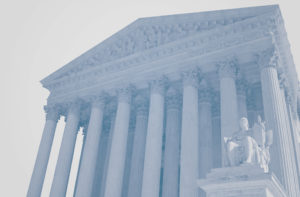The Fight to Liberate Abortion Access

January 22nd marks what would have been the 50th anniversary of the Supreme Court’s Roe v. Wade decision being in effect. For nearly half a century, women and people who can become pregnant relied on the protections afforded by the landmark 1973 ruling, which asserted that the Constitution protects a person’s decision to terminate a pregnancy as a right to privacy and revolutionized the health, lives, and possibilities of many.
According to Planned Parenthood Federation of America (PPFA), “In 1965, abortion was so unsafe that 17 percent of all deaths due to pregnancy and childbirth were the result of illegal abortion.” Under Roe, health outcomes and mortality rates related to pregnancy and childbirth vastly improved, with “less than 0.3 percent of women undergoing legal abortions at all gestational ages sustain[ing] a serious complication requiring hospitalization.”
Not only did Roe protect against dangerous health outcomes, it also acknowledged for women and those who can become pregnant one of the most important rights of all–agency. PPFA continues, “The Supreme Court noted in 1992 that ‘the ability of women to participate equally in the economic and social life of the Nation has been facilitated by their ability to control their reproductive lives’ (Planned Parenthood of Southeastern Pennsylvania v. Casey, 1992). Justice Harry Blackmun, the author of Roe, called the decision ‘a step that had to be taken as we go down the road toward the full emancipation of women’ (Greenhouse, 1994).”
Yet, as tirelessly as the sexual and reproductive health and rights (SRHR) community fought to maintain and further the principles established under Roe v. Wade, a radicalized Supreme Court hellbent on upending hard-fought progress, power, and precedent decided Dobbs v. Jackson Women’s Health Organization in June 2022. The opinion professes that the Constitution does not confer a right to an abortion, and overturns the landmark cases of Roe v. Wade and Planned Parenthood v. Casey.
There’s a reason why many refer to Roe as having been the floor, and not the ceiling: the Center for Reproductive Rights comments that “while Roe’s legal implications were enormous, even Roe could not make access a reality for everyone, and low-income people, people of color, young people, and others continued to face obstacles to abortion care.” Existing minimal access to abortion care has only been exacerbated, and in some cases, completely diminished, with the overturning of Roe and the establishment of Dobbs in just the past six months.
According to the Guttmacher Institute, “24 states have banned abortion or are likely to do so” since Roe was overturned, of which twelve of those are “enforcing a near-total ban with very limited exceptions.” Other states are categorized by Guttmacher as having: 1) gestational age bans in effect; 2) bans that are being challenged in court; 3) a projection to ban or restrict abortion; or 4) simply a lack of abortion availability. Read Guttmacher’s full analysis, which, as of this writing, was last updated on January 9, 2023, here.
Adjusting to the new reproductive legal landscape is ongoing and difficult, to say the least. As just one example, many clinics are forced to deal with an inpouring of people seeking abortions from heavily restricted states, which is causing backlogs that delay the procedure. Democracy Now! points out that “the push to ensure access to abortion has spurred new legal challenges and greater reliance on the abortion pill mifepristone, as medication abortions account for more than half of all U.S. abortions,” but anti-abortion opponent are now zeroing in on this as well.
The 2022 State of the Secular States report by American Atheists, in addition to analyzing the onslaught of devastating legislation from 2022, makes a grim prediction for 2023 legislative sessions: while many alarming efforts were defeated, “there is every reason to believe that the state legislative trends we saw in 2022 will continue into the 2023 legislative session”, which would include bills related to complete bans, further limitations, and personhood bills.
Organizations dedicated to SRHR and civil and human rights, including the American Humanist Association, are fighting to ensure that the right to an abortion does not continue to be bludgeoned as the upcoming 2023 legislative sessions commence – but these organizations, and all those experiencing the strife and desperation of losing access to their healthcare, need your help.
Commemorate Roe’s 50th anniversary this week by committing to breaking barriers and freeing abortion access for all. Support or volunteer with organizations fighting on the front lines for our reproductive rights at the local state, and national levels. Continue to uplift and utilize website like INeedAnA.com and abortionfinder.org, and donate to abortion funds that help those seeking care. Find a rally near you and make your voice heard, and attend an event with Planned Parenthood. If safe to do so, have conversations with your relatives and friends, explaining how critical it is that abortion rights are secured, and highlight real stories of individuals facing the consequences of these draconian laws. Importantly, register to vote and vote, recognizing the significance that state legislative activities and abortion ballot initiatives play in this fight.
